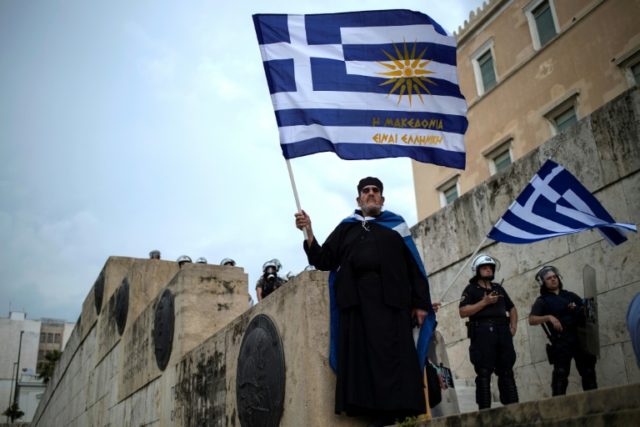A Greek diplomatic source told Reuters on Wednesday that Greece will expel two Russian diplomats “suspected of meddling in the politically sensitive issue of Macedonia.”
Greek media later said that up to four people might be expelled. Russia has threatened to retaliate in kind, creating one of the most serious breaches to date between the two countries.
Amazingly enough, this is all part of the fallout from an agreement between the prime ministers of Greece and Macedonia to formally rename the latter country “The Republic of North Macedonia.” The government of Greek Prime Minister Alexis Tsipras may yet come crashing down because of the deal.
Long story short: although the deal adds “North” to Macedonia’s name, the word many Greeks have a serious problem with is “Macedonia.” Greece has a province called Macedonia and invests a great deal of national pride in its storied history. They are also worried that if the former Yugoslav republic to the north is formally recognized as any version of “Macedonia,” it could eventually press claims on Greek territory with the same name.
Russia waded into the controversy because the name deal cleared the path for Macedonia to join the North Atlantic Treaty Organization, which just held a lively breakfast meeting with U.S. President Donald Trump.
NATO formally invited Macedonia to begin membership talks on Wednesday, but once again restated that it cannot join the alliance until the name issue is resolved. Membership in the European Union could follow. NATO membership has always been explicitly predicated on settling the name dispute with Greece, in part because Greece previously vetoed a Macedonian bid to join the alliance.
Russia is firmly opposed to NATO expanding its membership. Greece accuses the two Russian diplomats it means to expel of working with Greek opposition groups to organize rallies against the Macedonia name deal, and even of attempting to bribe Greek officials, with an eye toward ruining Macedonia’s chances of joining NATO.
“These expulsions are justified because they concern illegal activities at the expense of our national security,” said Reuters’ Greek diplomatic source. “However, the warnings of expulsions from the Russian side are unjustified because our (diplomats) act within the limits of their duties.”
Observers of the Greek diplomatic scene find all of this astonishing because Greece has long maintained warm relationships with Russia, illuminated by Orthodox religious ties. On that note, Greek media report officials in Athens are also concerned about Russian efforts to influence Greek society through religious organizations.
Although the diplomatic spat appears sudden, Greek officials said on Wednesday they have been quietly warning Moscow for months that the actions of its diplomats were unacceptable. The decision to expel the Russian personnel was allegedly made on the basis of “concrete evidence” that they posed a risk to Greek national security.
The BBC drily noted that Macedonians appear considerably less excited about either changing their name or joining NATO than the Greeks and Russians, saying, “Reactions to the name change and impending Nato membership have been rather muted in Macedonia. Street parties have been notable by their absence, but protests have not gained much traction either.”
This could explain why the Russians seem to have invested little effort in tinkering with Macedonian politics and sabotaging the deal on that end, even though NATO membership is conditional on the governments in both Athens and Skopje approving the deal. As the BBC pointed out, Macedonian nationalists were largely satisfied by simply putting the word “Macedonia” somewhere in their country’s official name, but Moscow saw plenty of opportunity for mischief in the reluctance of Greek nationalists to make that very concession.

COMMENTS
Please let us know if you're having issues with commenting.